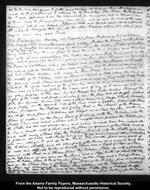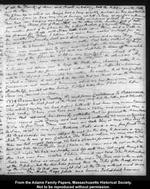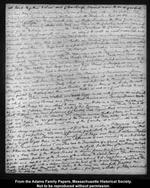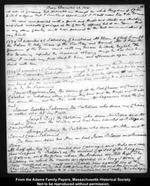Peace December 24. 1779
not cease at Corunna but persecuted me through the whole Kingdom of Spain to such a degree that I sometimes apprehended I should never live to see France.
We were now provided with a Guide and Horses and Mules and Mulateers and such miserable Carriages as the Country afforded, but at an Expence that in any other Country would have procured Us the best accommodations of every kind.
1779 December 25. Saturday.
Christmas. At Eleven O Clock I went to the Palace to take Leave of the Vice Roy and General. Mr. O Heir the Governor of the Town went with me, because he spoke English. The His Excellency repeated the thousand obliging things he had said to me when I made my first Visit to him, and afterwards again when I dined with him.
1779 December 26. Sunday.
The General, the Governor, the French Consul and Mr. Lagoanere, had influence enough to procure Us the best Guides and accommodations and Attendants, which the Country afforded, at upon Terms very hard for the miserable Things We had, according to a Contract made for Us by Mr. Lagoanere.
Senior Raymon San, the Owner of all the Post Chaises, or Chaises or Calashes or whatever other name they bore and the Horses and Mules that drew them, and the Man with whom Mr. Lagoanere made the Contract.
Senior Eusebio Seberino, the Postillion who drove my Chaise or rather who led my Horses.
Joseph Diaz the Postillion, who drove Mr. Dana and Mr. Thaxter. This was the Writer, and had been educated at St. Iago de Compostella.
Diego Antonio, the Postillion who drove Mr. Allen and Mr. Samuel Cooper Johonnot.
To these were Added two Men on foot Juan Blanco and Bernardo Bria.
At half after two We mounted our Carriages and Mules and rode four Leagues to Betanzos, the ancient Capital of the Kingdom of Gallicia, and the place where the Archives are still kept. The Building in which the records are deposited is a long Square, of Stone without any roof and stands over against one of the Churches. There are, in this little place, two Churches and two Convents. The last League of our road to it, was mountainous and rocky, to such a degree
Page 2
as to be very dangerous to Cattle and Carriages as well as Men. Mr. Lagoanere made Us the Compliment to attend Us to this place. The House, the Beds and the People appeared to me too
romantick for description, but a tolerable Idea of them may be formed from something which will be said of the next House in which We lodged. I found that our Guide and all our Spanish Attendants thought this and all the other Houses where We dined and lodged were very good Inns.
1779 December 27. Monday.
We travelled from Betanzos to Castillano. The roads still mountainous and rocky. Neither the Horses nor the Mules could be trusted, in ascending or descending the rocky Steeps of the Mountains
in the Carriges without two Men on foot to hold them by their bridles and their heads, and with all our precautions, We broke one of our Axle Trees, early in the day which prevented Us from going more than four Leagues in the whole. The House in Castillano where We lodged was of Stone, two Stories in height. We entered into the Kitchen, where was no floor but the Ground and no Carpet but Straw trodden into mire by Men, Hogs, horses and Mules. In the middle of the Kitchen was a Mound raised a little above the Level of the Ground with Stones and Earth, on which was a fire, with
Potts, Kettles, Skillets &c. of the fashion of the Country, over it, and round about it. There was no Chimney filled the room and if any of it ascended, it found no other passage to the open Air, but through two holes drilled through the
Tyles of the roof, not perpendicularly over the fire, but at Angles of about forty five degrees. On one Side was a
flew Oven, very large, black,
smoaky and sooty. On the opposite Side of the fire was a
Cabbin filled with Straw where I suppose the Patron del Casa, that is, the Master of the House, his Wife and four Chilldren, all lodged and slept together. On the same floor or rather on the same level of Ground, with the Kitchen was the Stable. There was indeed a Door which might have parted the Kitchen from the Stable: but this was always open, and indeed it would have been impossible to see or
breath with it shut: and the floor or ground of the Stable, was covered with miry Straw like the Kitchen. I went into the Stable and saw it filled on all Sides with Mules belonging to Us and several other Travellers who were obliged to put up, by the Rain. The Smoke filled every part of the Kitchen, Stable, and all other parts of the House, and was so thick that it was very difficult to see or breath. There was a flight of Steps of Stone covered with Mud and Straw, from the Kitchen floor up into a Chamber. On the left hand as you ascended the Stairs, was a Stage, built up about half Way from the Kitchen floor to the Chamber floor. On this Stage was a bed of Straw and on the Straw lay, a fatting hog. Around the Kitchen fire were arranged the Man and Woman of the House, four Children, all the Travellers, Servants,
Mulateers &c. Over the Fire was a very large Kettle, like a Pot Ash Kettle, full of Turnips and Onions, very large and very fine boiling for the Food
Page 3
of all the Family of Men and Beasts inhabiting both the Kitchen and the Stable, and the Stage.
The Chamber in which We lodged, had a large quantity, perhaps an hundred Bushells of Indian Corn in Ears, very small however, not half so large as our Corn in America. These Ears were hanging over head upon Poles and pieces of Joist. In one Corner was a large Binn, full of Rape Seed, on the other Side, another full of Oats. In another part of the Chamber lay a few Bushells of Chesnuts. There were two frames for Beds with Straw [illegible] beds upon them, and a Table in the middle. The Floor I believe had never been washed or swept for an hundred Years. Smoke, Soot and dirt, every where, and in every Thing. There were in the Chamber two Windows or rather Port holes without any glass. There were wooden dors to open and shut before the Windows. If these were shut there was no light and no Ventilator to draw off the unwholesome Air of the Chamber or let in any pure Air from abroad; if they were open We were exposed to all the cold and Vapours, from the external Air. My Inclination and Advice was to keep the Ports open, choosing to encounter the worst Air from abroad rather than be suffocated or poisoned with the Smoke and contaminated Air within. In addition to all these Comforts in such a Tavern it was not to be expected that We should escape the Bosom Companions and nocturnal Ennemies, which We had found every where else. Nevertheless, amidst all these horrors I slept better, than I had done before since my Arrival in Spain.
1779 December 28. Tuesday.
We went from Castilliana to Baamonde, and found the first part of the Road very bad, but the latter part tolerable. The whole Country We had passed hitherto had been very mountainous and rocky. There was here and there a Valley, and now and then a farm that appeared handsomely cultivated. But in general the Mountains were covered with Furze, and not much cultivated. We were astonished to see so few Trees. There was scarce an Oak, Elm, or any other Tree to be seen, except a very few Madeira Nuts and a very few fruit Trees. At Baamonde we were obliged to rest for the day, to procure a new Axle Tree to one of our Calashes. The House where We were, was better than our last nights lodgings. We had a Chamber for seven of Us to lodge in. We laid our beds upon
all the Tables and Chairs in the room and the rest on the floor as last night. We had no Smoke and less dirt than last night, though the floor had never been washed I believe since it was laid. The Kitchen and Stable were below as usual but in better order. The Fire was in the middle of the Kitchen: but the Air-holes pierced
thro the Tiles of the Roof, drew up the Smoke, so that one might sit at the Fire, without much inconvenience. The Mules, Hogs, fowls and human Inhabitants, however,
Page 4
all lived together below and Cleanliness seemed never to be regarded.
We had three Calashes, in Company. In one of them I rode with my two Children John and Charles: In another went Mr. Dana and Mr. Thaxter: In a third Mr. Allen and Samuel Cooper Johonnot. Our three Servants rode on Mules. Sometimes the three Gentlemen mounted the Mules of the Servants, Mules who took our Places in the Calashes, and were as much worse for the Exchange as We were the better. Sometimes the Children rode upon the Mules. And very frequently We were all obliged to walk as much more safe and agreable than Carriages or Saddles. The Calashes were very clumsy and inconvenient, somewhat resembling those in Use in Boston an hundred years ago. There was some finery about them in brass nails and paint. But the Leather was very old, and had never felt Oil since it was made. The Harness was broken in many places and tied together with twine and cords. The Appearance and the Furniture of the Mules were equally curious. Their Ears, Necks, Backs, Rumps and Tails, were shorn close to the Skinn. They were lean, but very strong and sure footed and seemed to be well shod. The Saddles had large Ears and high Rims or Ridges, all round behind the Rider. They had a breast plate before and a Breech band behind. They had large Wooden Stirrips, made like Boxes in a semicircular form bound round with Iron. In these Wooden Boxes, close at one End and open at the other, you inserted your Foot, which is well defended by them from rain and Sloughs. We had magnificent Curb Bridles to two or three of the Mules; the rest were guided by Haltars, and there was an Halter as well as a Curb Bridle to each of the others. There were Wallets or Saddle bags made with Canvas on each mule in which We carried Bread and Cheese, Meat, Knives and Forks, Spoons, Apples and Nutts. Indeed We were obliged to carry on our Mules, in a Waggon that attended Us, or in the Calashes, through the whole of this journey, our own Beds, Blanketts, Sheets, Pillows; our own provisions of Chocolat, Tea, Sugar, Meat, Wine, Spirits, and every Thing that We wanted. We carried our own Butter, Cheese, and indeed Salt and Pepper too. We got nothing at the Taverns but Fire, Water, and sometimes Salt and Pepper, and sometimes Wine of the Country at a reasonable rate.
I have always regretted that We could not find time to make a Pilgrimage to Saint Iago de Compostella. We were informed, particularly by Mr. Lagoanere, that the Original of this Shrine and Temple of St. Iago was this. A certain Shepherd saw a bright Light there in the night. Afterwards it was revealed to an Archbishop that St. James was buried there. This laid the Foundation of a Church, and they have built an Altar on the Spot where the Shepherd saw the Light. In the time of the Moors, the People made a Vow, that if the Moors should be driven from this Country, they would give a certain portion of the Income of their Lands to Saint James. The Moors were defeated and expelled and it was reported and believed, that Saint James was in the Battle and fought with a drawn Sword at the head of the Spanis Troops, on Horseback. The People, believing that they owed the Victory to the Saint, very chearfully fulfilled their Vows by paying the Tribute. But within a few Years, a Duke of Alva, a desendant




